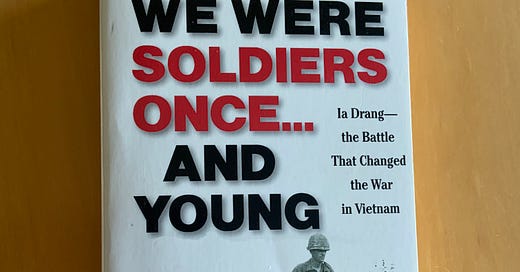Ft. Benning, home of the so many Army activities for generations, is now Ft. Moore as the on-going process of converting base names from honouring Civil War Confederate successionist generals continues. Today we are not going to argue whether that decision is appropriate; it is a Congressional mandate contained in the 2021 Defense Authorisation Act carried out by the Department of Defense. My own family history, as a native of Missouri, is split between Confederate and Union supporters generations back so I understand not only passions but the divisiveness. I have always marveled that Americans named bases after Confederates but those days are over.
The new designation is Ft. Moore, recalling the inidividual and joint contributions to Vietnam-era Army life made by Hal and Julia Moore. Harold ‘Hal’ Moore lived between 1922 and 2017, retiring in as a Lieutenant General in 1977. His wife, Julia Compton Moore, moved with him to multiple posts in the final 28 years of his military career following their marriage in 1949. Mrs. Moore passed away several years before him. Both are interred at the post cemetary in Columbus, Georgia.
The names are not familiar? i began tearing up when I heard the new designation because it is such a brilliant commoration of the family dedication required for a career in the military. Yes, tearing up because Hal and Julia Moore’s story in 1965 is one every adult in the United States should know. If you are one of the countless who don’t, you must change that right now because the book, We were Soldiers Once…and Young is a vital read. Order it and make sure your local library has copies.
The Vietnam War is growing fuzzier by the day for Americans. We are now further from the events in the Ia Drang Valley in November 1965 than those young men were from the Pearl Harbor attack in 1941. Americans never aced geography but we were unfamiliar with this location as a brutal battle occurred, providing so much evidence of our assumptions about so many aspects of the commitment in South Vietnam needed validation, if not outright rejection.
The book discusses not only how errors and assumptions played out for then Lt. Colonel Moore and his troops but also for his Vietnamese counterparts. Told by Moore in conjunction with war journalist Joe Galloway, the tale is gripping, painful, agonising, and infuriating. I never met Moore but he was indeed legendary and beloved. The volume is not a hagiography to his command at Ia Drang, however.
I did many years ago work with a central figure in the book, John Johns, who served as Dean of Faculty at the Industrial College of the Armed Forces when I arrived at the College across the street years back. Until I read (and sobbed through so much of) We Were Soldiers, I had no idea of Brigadier General/Dean Johns’s role in the battle—and survival of many.
Tragically, the losses at Ia Drang did not cause national reconsideration of our assumptions about the conflict or the enemy; tens of thousands more would die over the following decade before the Republic of Vietnam collapsed on 30 April 1975. We Were Soldiers endures cautioning citizens and government officials alike to evaluate, then periodically actually reaffirm—rather than merely continue because of ‘sunk costs’—whether both the national will persists and the means and ways support the ends of any conflict. Along the way, make sure we understand clearly what that end or cleanly articulated objectives actually is, something we seem to do less often of late.
We were Soldiers also recounts how, in an era of far less sophisticated and instantaneous communications, families were paralysed with fear for what they knew and what they tried to ignore in trying to bring up children through average childhoods here, thousands of miles away from their fathers (as it was in 1965) serving as our advance defense team. The many deaths affecting families at Fort Benning in mid-November 1965 heard by the impersonal telegrams delivered by taxi drivers rather than by someone else in the unit. Mrs. Moore sought to cushion, to lessen the pain, to increase the hope and to go through the fear and too often unbearable pain with those families. She stood with those awaiting word of survival while holding hands and hugs for those confronted with loss.
I have never known a career or long-term military woman or man who did not praise the family at home who sacrificed much while keeping watch for safe return. The families do go into service, or certainly war, with their loved ones, even if physically families are stationed off the battlefield. The fear and loss can be paralysing for some.
Read the book; the Mel Gibson movie is inadequate to portray the realities of war. I particularly commend this book because it narrates conflict while we still had a conscription system: the many characters, so often bringing to life the communities these soldiers represented, showed America in a war which drew in so many young. The tale illustrates how differently civil-military ties were prior to the All Volunteer Force beginning almost a decade after Ia Drang unfolded. The character of war remains the same but its narrower participation is markedly different today because people self-select out and into service. Before the draft ended in 1973, that was harder to do.
Lt. General and Mrs. Moore buried at Fort Benning must have been a factor in their name replacing Fort Benning. At the same time, there are serious, sustained efforts by military spouses and a number of not-for-profit support organisations to remind society that families matter a great deal in our volunteer force. Personnel costs are a serious portion of the Defense Department budget. Without better housing and salaries, childcare options on post, and various other ‘human’ factors, the men and women who serve as our defense might likely abandon their service commitments. The human support is even more expensive and largely intangible except for the commitment of those who are also experiencing the same.
Recognising Hal and Julia Moore’s contribution is not political correctness: it is reality in the world today. Too often in today’s fractured politics we cast aspersions on actions as if motives are invariably political. We need step back to praise those who act to make a difference, in war and in peace, even if it means changing the SOPs (standard operating procedures) by humanising them.
On this day of thanking mothers around the country, paying tribute to 28 years of her own service to the country by celebrating her and her husband’s contributions to our military and to our nation is long overdue. We owe so many our graditude.
FIN
Harold G. Moore and Joseph Galloway, We Were Soldiers Once…and Young (New York: Random House, 1992)
‘How a Military Base’s New Name Honours a Spouse and a Mother’, Nyt.com, 14 May 2023, https://www.nytimes.com/2023/05/14/us/politics/fort-benning-renamed-fort-moore.html
Kelby Hutchinson, ‘Fort Benning is now Fort Hutchinson. Name change celebrated in ceremony at Doughboy Stadium’, yahoo.com, 11 May 2023, retrieved at https://news.yahoo.com/fort-benning-now-fort-moore-175438352.html





